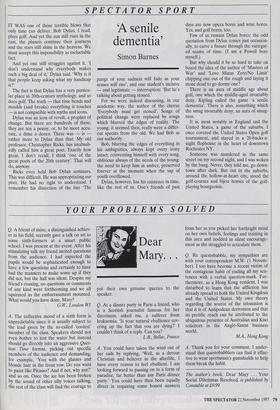SPECTATOR SPORT
`A senile dementia'
Simon Barnes
IT WAS one of those terrible blows that only time can deliver. Bob Dylan, I read, plays golf. And yet the sun still rises in the east, the planets continue their journeys and the stars still shine in the heavens. We must accept this impossibility as ineluctable fact.
And yet one still struggles against it. 'I don't understand why everybody makes such a big deal of it,' Dylan said. 'Why is it that people keep asking what my handicap is?'
The fact is that Dylan has a very particu- lar place in 20th-century mythology, and so does golf. The truth — that time bends and moulds (and breaks) everything it touches — is not compatible with myths and icons.
Dylan was an icon of revolt, a prophet of change. But there are hundreds of these, they are ten a penny, or, to be more accu- rate, a dime a dozen. There was — is rather more to Dylan than that. My old professor, Christopher Ricks, has unabash- edly called him a great poet. Exactly how great, I don't recall, I think 'one of the great poets of the 20th century'. That will do, anyway.
Ricks even held Bob Dylan seminars. This was difficult. He was appropriating our poet. He had no right to understand. I remember his dissection of the line 'The pangs of your sadness will fade as your senses will rise', and one student's incisive — and legitimate — interruption: 'But he's talking about getting stoned.'
For we were indeed discussing, in our academic way, the author of the chorus `Everybody must get stoned'. Songs of political change were replaced by songs which blurred the edges of reality. The young, it seemed then, really were a differ- ent species from the old. We had Bob as our authority.
Bob, blurring the edges of everything in his ambiguities, always kept every irony intact, reinventing himself with every song, oblivious always of the needs of the young: the need to keep him in amber, preserved forever at the moment when the sap of youth overflowed.
Dylan, however, has his existence in time, like the rest of us. One's friends of past days are now opera bores and wine bores. Yes, and golf bores, too.
Few of us remain Dylan bores: the odd quotation from Dylan comes just occasion- ally, to carve a fissure through the variegat- ed seams of time. (I am a Powell bore myself.) But why should it be so hard to take on board the idea of the author of 'Masters of War' and 'Love Minus Zero/No Limit' chipping one out of the rough and laying it stone dead to go dormy one?
There is an aura of middle age about golf, one which the middle-aged invariably deny. Kipling called the game 'a senile dementia'. There is also, something which the smug invariably deny, an aura of smug- ness.
It is, most notably in England and the United States, a game of the suburbs. I once covered the United States Open golf tournament, and stayed in a 20-bucks-a- night flophouse in the heart of downtown Rochester NY.
Someone was murdered in the same street on my second night, and I was woken by the bang. Never, they told me, go down- town after dark. But out in the suburbs, around the hollow-at-heart city, stood the golf-courses and bijou homes of the golf- playing bourgeoisie.


















































































 Previous page
Previous page